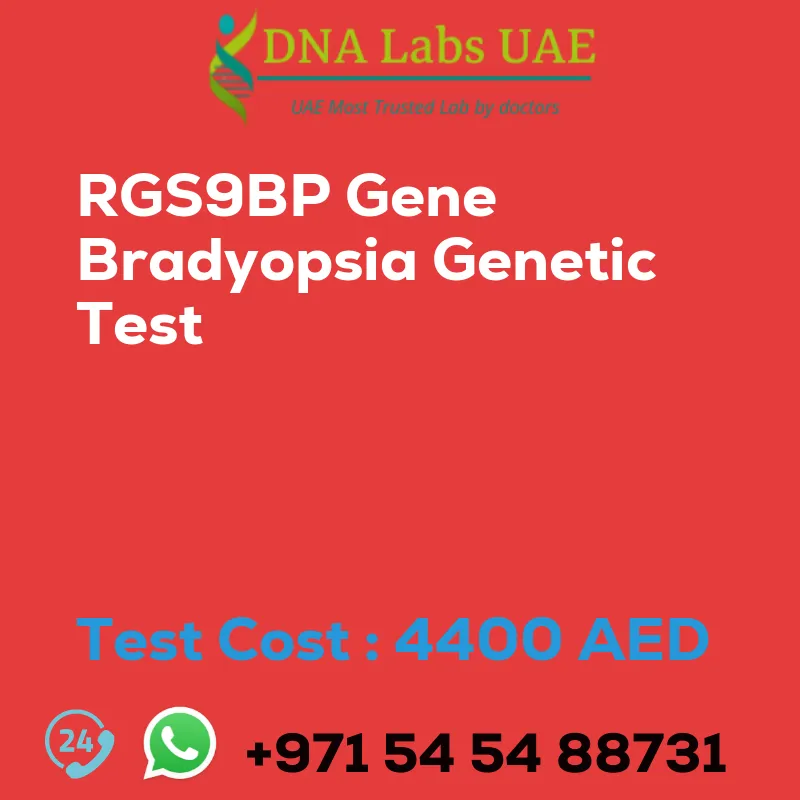RGS9BP Gene Bradyopsia Genetic Test
Welcome to DNA Labs UAE’s blog post on the RGS9BP Gene Bradyopsia Genetic Test. In this article, we will provide you with detailed information about the test, including its components, cost, symptoms, diagnosis, and more.
Test Name: RGS9BP Gene Bradyopsia Genetic Test
Components: Blood or Extracted DNA or One drop Blood on FTA Card
Price: 4400.0 AED
Sample Condition: Blood or Extracted DNA or One drop Blood on FTA Card
Report Delivery: 3 to 4 Weeks
Method: NGS Technology
Test type: Ophthalmology Disorders
Doctor: Ophthalmologist
Test Department: Genetics
Pre Test Information
Prior to undergoing the RGS9BP Gene Bradyopsia Genetic Test, it is important to provide the clinical history of the patient. Additionally, a genetic counseling session may be conducted to draw a pedigree chart of family members affected by the RGS9BP Gene Bradyopsia NGS Genetic DNA Test gene RGS9BP.
Test Details
The RGS9BP gene is responsible for producing a protein called RGS9-binding protein. This protein plays a crucial role in the regulation of neurotransmitters in the brain, including dopamine and serotonin. Mutations in the RGS9BP gene have been associated with various neurological disorders, including bradyopsia.
Bradyopsia is a rare condition that affects an individual’s ability to perceive visual motion. People with bradyopsia experience a delay in their perception of motion, which can lead to difficulties with activities such as driving, sports, and navigating through crowded areas. Genetic testing can be used to identify mutations in the RGS9BP gene that may be responsible for bradyopsia.
NGS (next-generation sequencing) is a state-of-the-art genetic testing technology that allows for the simultaneous analysis of multiple genes. This technology has revolutionized the field of genetics, enabling quick and accurate identification of genetic mutations associated with various disorders, including bradyopsia. NGS testing for bradyopsia typically involves sequencing the RGS9BP gene and other genes involved in visual processing.
It is important to note that genetic testing is not always necessary or appropriate for individuals with bradyopsia. A comprehensive evaluation by a healthcare professional, including a thorough eye exam and neurological assessment, may be sufficient for diagnosis and management of the condition.
If you suspect that you or a loved one may have bradyopsia or require genetic testing, we recommend consulting with an ophthalmologist or a healthcare professional specializing in genetics. They will be able to provide you with the necessary guidance and support.
Thank you for reading our blog post on the RGS9BP Gene Bradyopsia Genetic Test. For more information about our services or to schedule an appointment, please visit DNA Labs UAE’s website.
| Test Name | RGS9BP Gene Bradyopsia Genetic Test |
|---|---|
| Components | |
| Price | 4400.0 AED |
| Sample Condition | Blood or Extracted DNA or One drop Blood on FTA Card |
| Report Delivery | 3 to 4 Weeks |
| Method | NGS Technology |
| Test type | Ophthalmology Disorders |
| Doctor | Ophthalmologist |
| Test Department: | Genetics |
| Pre Test Information | Clinical History of Patient who is going for RGS9BP Gene Bradyopsia NGS Genetic DNA Test. A Genetic Counselling session to draw a pedigree chart of family members affected with RGS9BP Gene Bradyopsia NGS Genetic DNA Test gene RGS9BP |
| Test Details |
The RGS9BP gene is responsible for producing a protein called RGS9-binding protein. This protein plays a role in the regulation of neurotransmitters in the brain, including dopamine and serotonin. Mutations in the RGS9BP gene have been associated with various neurological disorders, including bradyopsia. Bradyopsia is a rare condition that affects the ability to perceive visual motion. People with bradyopsia experience a delay in their perception of motion, which can lead to difficulty with activities such as driving, sports, and navigating through crowded areas. Genetic testing can be used to identify mutations in the RGS9BP gene that may be responsible for bradyopsia. NGS (next-generation sequencing) is a type of genetic testing that allows for the simultaneous analysis of multiple genes. This technology has revolutionized the field of genetics, making it possible to quickly and accurately identify genetic mutations associated with various disorders, including bradyopsia. NGS testing for bradyopsia typically involves sequencing the RGS9BP gene and other genes that may be involved in visual processing. It is important to note that genetic testing is not always necessary or appropriate for individuals with bradyopsia. A thorough evaluation by a healthcare professional, including a comprehensive eye exam and neurological assessment, may be sufficient for diagnosis and management of the condition. |








